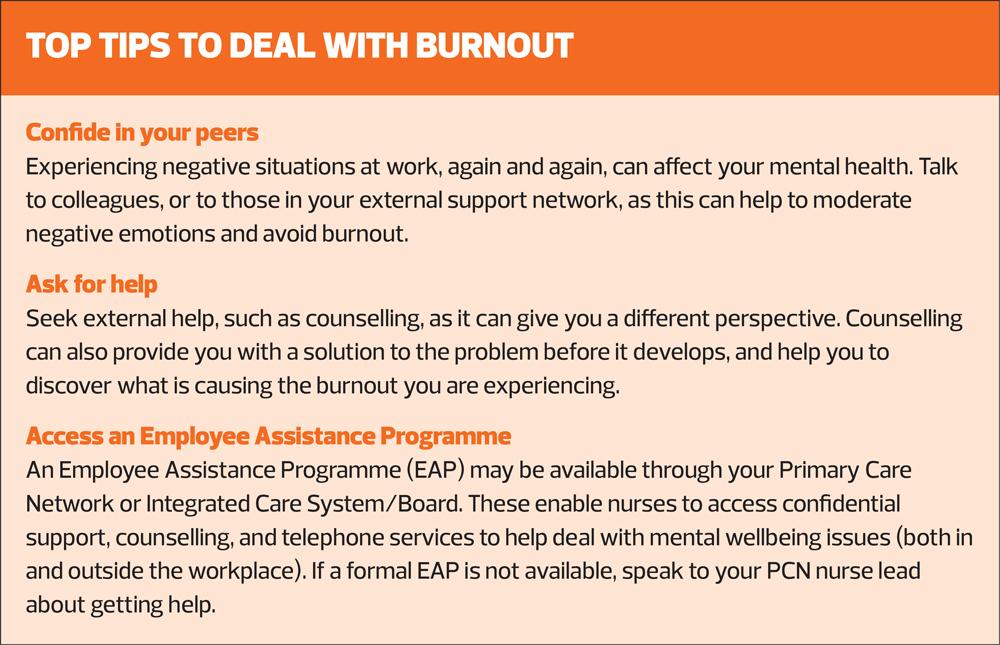
Recognising and dealing with work-related burnout
Practice Nurse 2023;53(2):20-21
Practice Nurse 2023;53(2):20-21
Given the current pressures in primary care, it is not surprising that general practice nurses are feeling stressed, and even burned out. But what can you do to ease the strain?
Four out of ten nurses reported that their mental health was worse in 2022 than it was during the peak of the COVID-19 pandemic in 2020 and in 2021, according to research by Nursing Times.
The findings cite lack of staff, financial concerns, and patient safety as the key issues that negatively affect mental wellbeing in the workplace.
As well as contending with these issues day-to-day, there is also the emotional aspect of the job, which understandably has an impact on nurses’ mental well-being, causing workplace stress, and often leading to burnout.
But how do we know when we’re experiencing burnout and what we can do to prevent it?
Renowned stress expert, Professor Sir Cary Cooper, Advisory Board Member at Delamere, a private addiction rehab clinic in Cheshire, sheds light on the issue of burnout and how to prevent it within a healthcare workplace.
HOW CAN YOU SPOT AND PREVENT BURNOUT?
Burnout is when an individual physically and psychologically cannot do their job anymore. This could be due to heavy work pressures, long hours, or workload. Nurses can be particularly prone to experiencing burnout due to the physical and emotional demands of their job.
WHAT ARE THE KEY SIGNS OF BURNOUT?
Burnout is characterised by three signs: feelings of exhaustion; negativity about your job role; and reduced effectiveness. The key component to preventing burnout is identifying the symptoms as early as possible, before the demand becomes too much, leading to depression.
Feeling exhausted
Nurses on the verge of burnout, due to either stress or increased workload, can begin to experience and display emotional and physical signs of exhaustion.
They begin to feel a lack of physical energy, but they also develop feelings of being emotionally drained and depleted. A common sign of exhaustion is the lack of motivation to get out of bed in the morning, or when day-to-day work tasks become more challenging than normal.
Over-exhaustion and extreme tiredness can result in sickness. The lack of energy from burnout can lead to increased frequency of common colds and flu. An increasing number of days off sick can be a sign of exhaustion and work-related burnout.
Feeling sensitive and irritable
Aggressive behaviour is also a common indicator of burnout, either within the workplace or outside of office hours, or both. People may experience a level of sensitivity and aggression towards their family, friends and colleagues.
While everybody experiences some negative emotions within their job roles, it’s vital to recognise when these feelings are becoming unusually pronounced.
Feeling unmotivated
Burnt out nurses may begin to feel more socially withdrawn and find themselves disconnecting with the workplace. This could be recognised as not getting involved with colleague discussions, negative attitude towards work and slipping job performance.
Changes to work motivation can lead to nurses taking additional days off, or arriving late. This is something GP partners and practice managers should look out for before it becomes untenable.
HOW CAN YOU DEAL WITH BURNOUT?
Recognising the three key signs are crucial, but there are five strategies and tools you can use to avoid burnout before it becomes too much of an issue.
Finding the root of the problem
Burnout can be a response to stress, increased working hours, changes to the work environment and increased workload. But finding where the issue has stemmed from can be beneficial in helping you deal with the situation. Speak to your practice manager or a senior GP and be honest about how you are feeling.
Royal College of Nursing (RCN) counselling services
RCN members can gain access to free and confidential counselling support, to deal with any personal and work-related emotional issues. A trained counsellor or therapist listens to your feelings and helps you find a solution. Many people will find talking to a stranger easier than opening up to someone they know.
Counselling and talking therapies can benefit nurses and offer a sense of relief by allowing them to discuss how they are feeling in an open and confidential environment. It can also aid in developing a deeper understanding of what is causing you to feel negativity.
Call RCN Direct on 0345 772 6100,
Nursing & Midwifery Council – Fitness to Practise Careline
If, in addition to experiencing symptoms of workplace stress and burnout, you are also going through the Fitness to Practise process, the NMC has a Fitness to Practise Careline in place to offer support.
As this process may be particularly stressful, the Careline offers support, practical help and advice from trained counsellors.
Call 0800 587 7396.
Write a journal or diary
Keeping a journal or a diary can be a positive outlet when it comes to managing negative thoughts. You may find that getting your emotions down on paper can offer a form of release, especially after a long clinic where you may have encountered several difficult and emotional situations. If you find it difficult to talk about these situations and feelings with others, writing your feelings down can often be the best method to get your feelings out.
Find out more at https://delamere.com/addiction-treatment/work-burnout
Related articles
View all Articles
